Sleep wake homeostasis - Study guides, Class notes & Summaries
Looking for the best study guides, study notes and summaries about Sleep wake homeostasis? On this page you'll find 304 study documents about Sleep wake homeostasis.
Page 2 out of 304 results
Sort by
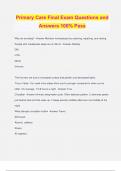
-
Primary Care Final Exam Questions and Answers 100% Pass
- Exam (elaborations) • 48 pages • 2024
- Available in package deal
-
- $13.49
- + learn more
Primary Care Final Exam Questions and Answers 100% Pass Why do we sleep? -Answer-Maintain homeostasis by restoring, repairing, and resting. People with inadequate sleep are at risk for -Answer-Obesity DM HTN Mood Immune The first two are due to increased cortisol and ghrelin and decreased leptin. True or false: You need more sleep when you're younger compared to when you're older. On average, 7.5-8 hours a night. -Answer-True Circadian -Answer-Intrinsic sleep/wake cycle. Often bipha...
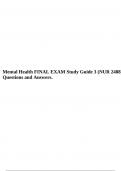
-
Mental Health FINAL EXAM Study Guide 3 (NUR 2488) Questions and Answers.
- Exam (elaborations) • 18 pages • 2024
- Available in package deal
-
- $12.99
- + learn more
Mental Health FINAL EXAM Study Guide 3 (NUR 2488) Questions and Answers. Mental Health FINAL EXAM Study Guide – A 1 EBP (evidence based practice) Using the best available research evidence, clinical expertise, & patient preferences to make clinical decisions The 5 A’s of integrating best evidence into clinical practices includes: Asking Acquiring Appraising Applying Assessing The mental health recovery model is one of helping people with psychiatric disabilities effectively manage...
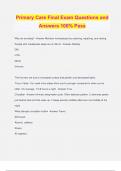
-
Primary Care Final Exam Questions and Answers 100% Pass
- Exam (elaborations) • 48 pages • 2024
- Available in package deal
-
- $13.49
- + learn more
Primary Care Final Exam Questions and Answers 100% Pass Why do we sleep? -Answer-Maintain homeostasis by restoring, repairing, and resting. People with inadequate sleep are at risk for -Answer-Obesity DM HTN Mood Immune The first two are due to increased cortisol and ghrelin and decreased leptin. True or false: You need more sleep when you're younger compared to when you're older. On average, 7.5-8 hours a night. -Answer-True Circadian -Answer-Intrinsic sleep/wake cycle. Often bipha...
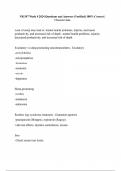
-
NR 547 WEEK 4 2024 QUESTIONS AND ANSWERS (VERIFIED) 100% CORRECT | GRADE A+
- Exam (elaborations) • 25 pages • 2024
-
Available in package deal
-
- $13.00
- + learn more
Lack of sleep may lead to: mental health problems, injuries, decreased productivity, and increased risk of death - mental health problems, injuries, decreased productivity, and increased risk of death Excitatory vs sleep-promoting neurotransmitters - Excitatory -acetylcholine -norepinephrine -histamine -serotonin -orexin -dopamine Sleep-promoting -GABA -melatonin -adenosine Restless legs syndrome treatment - Dopamine agonists -pramipexole (Mirapex), ropinirole (Requip) • adverse ...
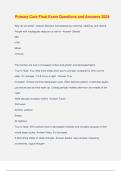
-
Primary Care Final Exam Questions and Answers 2024
- Exam (elaborations) • 48 pages • 2024
- Available in package deal
-
- $13.49
- + learn more
Primary Care Final Exam Questions and Answers 2024 Why do we sleep? -Answer-Maintain homeostasis by restoring, repairing, and resting. People with inadequate sleep are at risk for -Answer-Obesity DM HTN Mood Immune The first two are due to increased cortisol and ghrelin and decreased leptin. True or false: You need more sleep when you're younger compared to when you're older. On average, 7.5-8 hours a night. -Answer-True Circadian -Answer-Intrinsic sleep/wake cycle. Often biphasic pa...
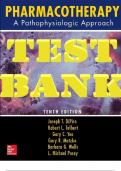
-
TEST BANK for Pharmacotherapy: A Pathophysiologic Approach, 10th Edition. DiPiro Joseph, Talbert Robert, Yee Gary, Barbara and Posey. ISBN-13 978-1259587481. (Complete Chapters 1-144)
- Other • 404 pages • 2024
-
- $22.49
- + learn more
TABLE OF CONTENTS:_ CH 1: Health Litera cy and Medication Use CH 2: Cultural Competency CH 3: Medication Safety Principles and Practices CH 4: Clinical Pharmacokinetics and Pharmacodynamics CH 5: Pharmacogenetics CH 6: Pediatrics CH 7: Geriatrics CH 8: Palliative Care CH 9: Clinical Toxicology CH 10: Clinical Management of Potential Bioterrorism-related conditions CH 11: Cardiovascular Testing CH 12: Cardiac Arrest CH 13: Hypertension CH 14: Chronic Heart Failure CH 15: Acute Decompensated Heart...
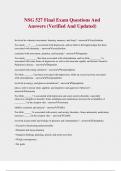
-
NSG 527 Final Exam Questions And Answers (Verified And Updated)
- Exam (elaborations) • 20 pages • 2024
-
- $12.49
- + learn more
NSG 527 Final Exam Questions And Answers (Verified And Updated) Involved in voluntary movement, learning, memory, and sleep? - answerAcetylcholine Too much ___?_____is associated with depression, and too little in the hippocampus has been associated with dementia. - answeracetylcholine correlated with movement, attention, and learning? - answerDopamine Too much__________?has been associated with schizophrenia, and too little_________? is associated with some forms of depression as well as...
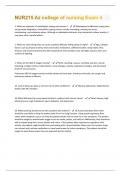
-
NUR215 Az college of nursing Exam 4 Questions & Answers Solved 100% Correct!!
- Exam (elaborations) • 7 pages • 2024
-
- $7.99
- + learn more
1. What are examples of maladaptive coping mechanisms? - Maladaptive (ineffective) coping does not promote adaptation. Unhealthful coping choices include overeating, working too much, oversleeping, and substance abuse. Although a maladaptive behavior may temporarily relieve anxiety, it may have other harmful effects. 1. What are some things that can cause a patient difficulty falling asleep at night? - Age, Lifestyle factors such as physical activity, food and alcohol, medication, caffeine/...
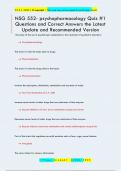
-
NSG 552- psychopharmacology Quiz #1 Questions and Correct Answers the Latest Update and Recommended Version
- Exam (elaborations) • 23 pages • 2024
-
- $12.49
- + learn more
The study of the use of psychotropic medications in the treatment of psychiatric disorders: → Psychopharmacology The study of what the body does to drugs: → Pharmacokinetics The study of what the drugs does to the body: → Pharmacodynamics Involves the absorption, distribution, metabolism and excretion of meds: → First Pass Metabolism (C.Y.P. 450) Increase serum levels of other drugs that are substrates of that enzyme: → Enzyme inhibitors will slow down metabolism causing toxic...
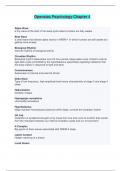
-
Openstax Psychology Chapter 4 Key Terms and Definitions
- Exam (elaborations) • 3 pages • 2024
-
Available in package deal
-
- $10.49
- + learn more
Openstax Psychology Chapter 4 Key Terms and Definitions Alpha Wave a tiny wave at the start of the sleep cycle where humans are fully awake Beta Wave a small wave that follows alpha waves in NREM-1 in which humans are still awake but getting more drowsy Biological Rhythm Internal rhythms of biological activity Circadian Rhythm Biological rhythm takes place over 24-hour period, sleep-wake cycle, linked to natural light-dark cycle (controlled by the hypothalamus-specifically regarding melatonin ...

Study stress? For sellers on Stuvia, these are actually golden times. KA-CHING! Earn from your study resources too and start uploading now. Discover all about earning on Stuvia


